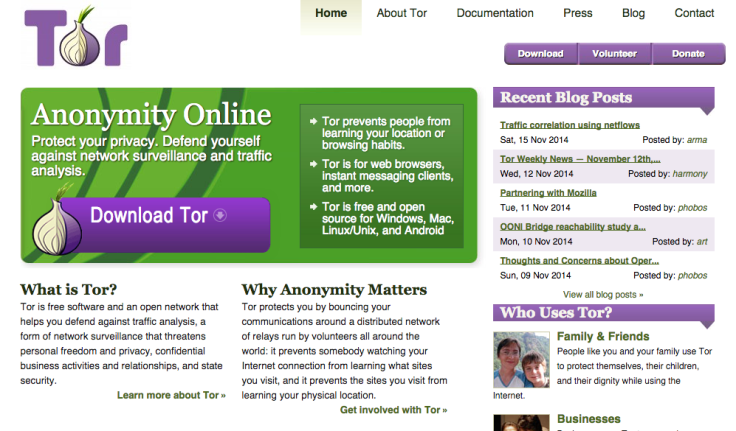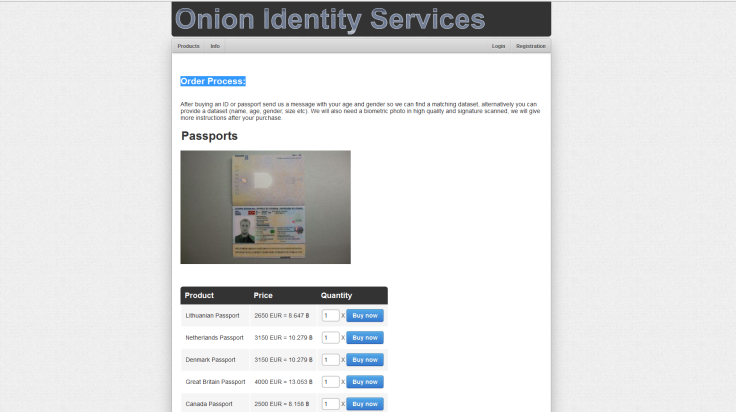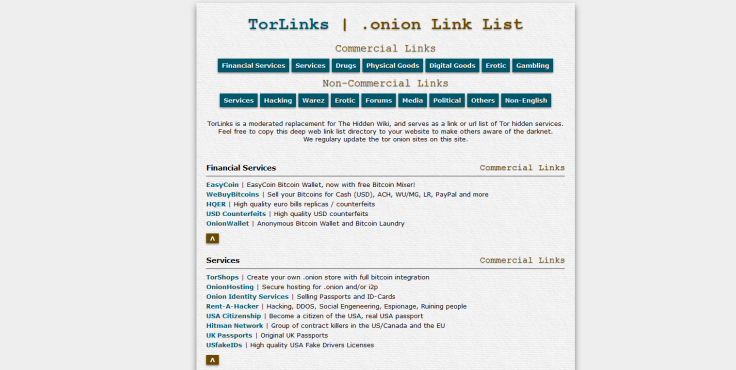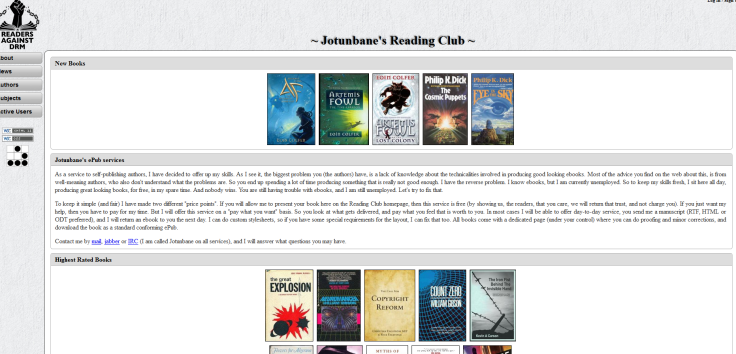Tour The Deep Web: Illegal Marketplaces, Book Clubs And Everything In Between

Care for a Ukrainian passport? Pure, uncut heroin? Some legit credit card numbers? All these things are available in the back alleys of the Internet, an area that has become known by the generic catchall "deep Web." The deep Web by definition is that which is not indexed by search engines; to get there, you use anonymity software, online forums, Internet relay chat rooms or simply by knowing where to go.
The online drug emporium Silk Road, taken down by the FBI last year, brought the notion of the deep Web to the public consciousness. Edward J. Snowden used it to share information with journalist Glenn Greenwald on the surveillance practices of the National Security Agency, stories that ended up winning a Pulitzer Prize.
But while anyone can access the deep Web, navigating the world beyond Google definitely requires know-how. Unlike the graphical, HTML-based "surface Web," no one is holding your hand in the deep Web. The point is that it's not accessible; if you have to ask, you're not supposed to be there.
But we're here to give you a tour of the deep Web, how it's used and what you'll find there. To quote one Obi-Wan Kenobi: "You will never find a more wretched hive of scum and villainy. We must be cautious."
The most reliable way of falling into the deep Web, which, again, is only defined as the massive unregulated space not accessible via traditional search engines, is through The Onion Router (Tor). The Tor we now use was developed by the Tor Project and is available as a free download, which provides instructions on how users can install an entirely new browser on their computer. Unlike Google Chrome or Firefox, Tor cloaks the origin of a user’s Internet connection while also giving the user access to .onion links, where much of the deep Web lives. Instead of commonly used extensions such as .com, .org or .edu, sites on Tor use .onion for domains.

The most obvious next step for newcomers is to find a listing of popular deep Web websites. Again, by definition, sites within the deep Web aren’t listed on any search engines, though a number of .onion sites exist for the sole purpose of providing links to other sites otherwise buried. Two of the most prominent are http://onion.lt and http://torlinkbgs6aabns.onion. (Note: Neither link is accessible without Tor, and following them is not recommended.)

After finding a link site, the options become clearer: Popular sites range from drug markets such as the notorious Russian-language RAMP to deep Web-specific media or political debate forums. If the deep Web is everything beyond search engines, the so-called dark Web is the red-light district, where illegal goods and services are sold out in the open.

The dark Web has everything you could possibly want, need or were ever curious about but afraid to ask. There are dedicated search engines that will help ease your way into this world and plenty of wikis full of links to dark Web sites. Another sector of the dark Web is all about finance. TorBroker lets you trade stocks and securities using bitcoin while Bitcoin Fog acts as a "bitcoin laundry." There are other sites for bitcoin wallets and cash-for-bitcoin exchanges.
Counterfeit euros and dollars are part of the illegal commercial enterprise of the dark Web. Electronic goods, hitmen, guns, passports, fake IDs and hackers for hire are also readily available. The drug marketplace is robust with sites such as Agora, Evolution Marketplace, the People's Drug Store, Smokeables and the Majestic Garden all open for business. The FBI, in addition to infiltrating Silk Road, infected users with malware to hack into Tor, which led to a massive child pornography (known as "hard candy" the dark Web) bust in 2013.
There are technical sites to be found on Tor, including dedicated hosting services, anonymous email and chat services as well as Twitter clones. Blogs and forums to discuss politics or anything else are also on the dark Web.
While it may not become mainstream, the ongoing debate over privacy vs. security has convinced many people to sign up, thus strengthening each individual connection, and Tor has greatly increased its connection speed. Tor sites still take much longer to load than sites you'll find by searching on Google, but with recent improvements, visitors can now log on to drug markets, support forums and even private book clubs without feeling like they’re doing so with a dial-up connection.
The excruciatingly slow navigation may have become slightly faster, but the biggest and most inconvenient Tor feature remains firmly intact and likely to never change. That's because the biggest disadvantage to Tor is its best feature -- namely, the difficulty to track down anything. Sites are often unavailable or temporarily offline, and established outposts can jump to a new address without much warning. In many ways, this is Tor's fatal flaw and likely one that it will never overcome.
Tyson Johnson, vice president of business development for BrightPlanet, a deep Web intelligence institute founded by Mike Bergman, who coined the phrase used to describe the hidden Internet, breaks down the Internet into the surface Web, deep Web and dark Web. “Surface Web is everything Google, Yahoo and Bing can index when you do a search query. The deep Web are sites that still have a very public facing IP, think of WebMD or YellowPages.com, where, until you enter a search query, you don’t get access to any of the dynamic content," Johnson explained in an interview with International Business Times.
"The dark Web that we talk about with things like Tor, are sites that obfuscate their identity and where they are located. With Tor it's like a VPN [virtual private network] to get in, and then you can kind of dance around inside Tor," Johnson said.
Johnson's own experience with the dark Web is similar to ours. Onion sites can be interesting, but the speed and uncertainty are major drawbacks for any mainstream user thinking about testing the waters. "It's not a place where you're going to bookmark something in your favorites and find it later. What Tor is really good at is underground activity. It's good at protecting its identity and the identity of its users. Think of the old days of Prohibition, a kind of underground drinking establishment. In essence, it's the digital saloon, but it's not convenient. These sites jump IPs, they go through additional routers to obfuscate where they are located, meaning what is an active link today is a dead link tomorrow, so it's a frustrating user experience," Johnson said.

While that commitment to rerouting a user’s connection guarantees a higher level of privacy, Tor has also been criticized for failing to ensure that users are able to browse the Internet with short loading times. "In terms of Tor, it's not as simple or straightforward for the average user as it would be on surface or deep. And for the average citizen, you're not really going to bump into Tor; you kind of have to go looking for it. Which is a good way of saying it's not on the radar screen for most people," Johnson said.
The Edward Snowden leaks or the general discussion has made privacy a topic of conversation, but Johnson does not think the security concerns will lead to Tor becoming as much of a mainstream option as using your default browser. "Things like Snowden really shone a light on the concerns that the public have with how their information is used and who is watching them. The thing to remember is, for most people, we're talking about public open source-facing Internet activity, and as long as the education continues to progress at the same speed as the technology, I think we'll be OK," Johnson said.
"I think it [Tor] becomes the playground, more and more, for underground activity. I don't think you're going to see in 10 years time the average citizen is anonymized to make sure what they do online is still outside the eyes of the greater public," Johnson said.
© Copyright IBTimes 2024. All rights reserved.





















